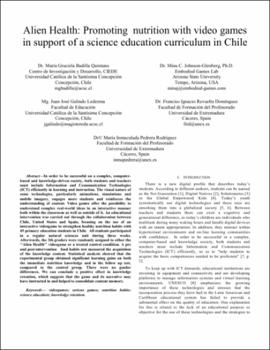Alien Health: Promoting nutrition with video games in support of a science education curriculum in Chile
Date
2017Abstract
In order to be successful on a complex, computer-based and knowledge-driven society, both students and teachers must include Information and Communication Technologies (ICT) efficiently in learning and instruction. The visual nature of some technologies, particularly animations, simulations and mobile imagery, engages more students and reinforces the understanding of content. Video games offer the possibility to understand complex real-world ideas in an interactive manner both within the classroom as well as outside of it. An educational intervention was carried out through the collaboration between Chile, United States and Spain, focusing on the use of an interactive videogame to strengthen healthy nutrition habits with 45 primary education students in Chile. All students participated in a regular natural sciences unit during three weeks. Afterwards, the 3th graders were randomly assigned to either the ‘‘Alien Health’’ videogame or a treated control condition. A pre and post-intervention food habits test measured the acquisition of the knowledge content. Statistical analysis showed that the experimental group obtained significant learning gains on both the immediate nutrition knowledge and in the follow up test, compared to the control group. There were no gender differences. We can conclude a positive effect in knowledge retention, which suggests that the game and its narrative may have instructed in and helped to consolidate content memory.





